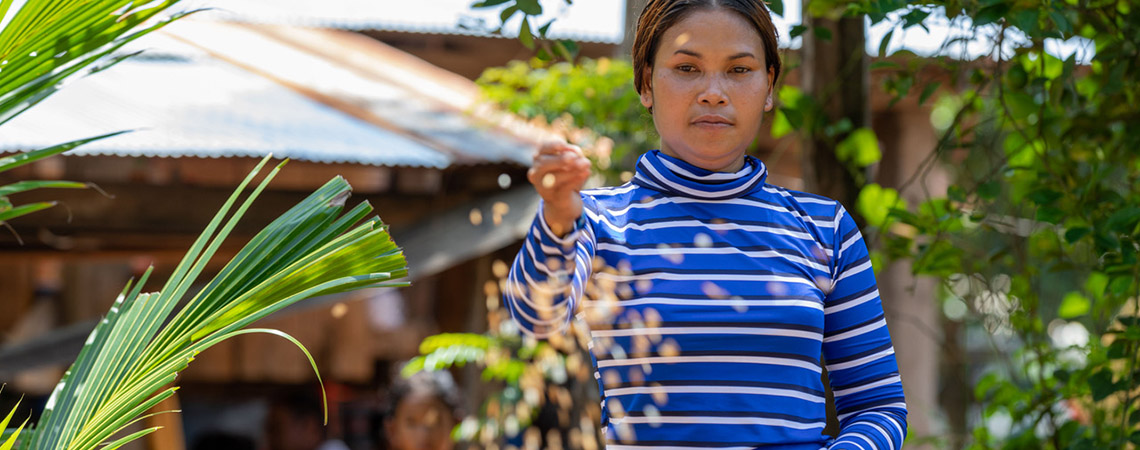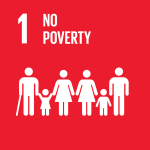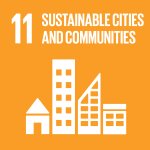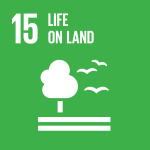
Photo:
The Tonle Sap Basin, an expansive area of economic importance and the cultural heart of Cambodia, is being severely impacted by climate change, with increasing temperatures and shifting rainfall patterns having a major impact on water resources and agricultural productivity, as well as increasing the frequency and intensity of extreme events such as drought and floods.
The impacts of climate change are exacerbated by the degradation of forest ecosystems, threatening the regulation of hydrological cycles in the region. As the agroecological landscape is degraded, the critical ecosystem services they provide are being lost, with severe consequences for the sustainability of water resources and the livelihoods they support, as well as the tourism industry, which is a major contributor to the local and national economy.
The resultant impacts on natural resource-based livelihoods are driving local communities to adopt maladaptive practices such as agricultural expansion into forest areas, fuelling a negative cycle of degradation in the catchments.
To address climate vulnerability and the drivers of environmental degradation in the Tonle Sap Basin and safeguard the natural and cultural heritage of the region, the Government of Cambodia will introduce a systematic and integrated approach to landscape management.
This will be implemented through two complementary projects – one positioned under the GEF-8 Integrated Programme for Ecosystem Restoration focusing on the conservation and restoration of forest ecosystems across the Tonle Sap Basin, and this five-year project (2026-2031) focusing on building the resilience of communities within the Tonle Sap Basin against the increasing impact of floods and drought.
- Community
- Municipality
- District
- National
- Local Governments
- National Governments
- Non-Governmental Organizations
- Private Sector Partners
- United Nations Development Programme (UNDP)
70,400 direct beneficiaries (35,200 female; 35,200 male)
- Government of Cambodia
- Global Environment Facility (GEF)
- United Nations Development Programme (UNDP)
Expected outcomes
Outcome 1. Strengthened capacity for coordination, planning and implementation of integrated watershed management at the national and provincial levels.
Outcome 2. Strengthened resilience of communities in the Siem Reap/Phnom Kulen landscape through scalable Nature-based Solutions and sustainable finance
Outcome 3. Increased adoption of climate-resilient natural resource-based livelihoods incentivised through training, market development and innovative finance mechanisms
Outcome 4. Innovation in the management of watersheds across Cambodia enabled through high-quality knowledge, reserach and learning.
Outcome 5. Lessons learned curated through project M&E and disseminated both nationally and internationally to promote the scaling of interventions to other watersheds across Cambodia and the surrounding region.
- Image

- Image

- Image

- Image

The landscape and watershed management solutions will take a systems-based approach, accounting for three key pillars identified for sustainable investment in Cambodia, namely governance, finance, and people. When underpinned by a foundation of research, knowledge and learning, an approach built on these pillars will ensure that the appropriate enabling environment is created for sustainable and scalable impact, with crosscutting benefits.
Improved management of vulnerable landscapes and watersheds across the Tonle Sap Basin will include the conservation and active rehabilitation of degraded ecosystems to restore the provision of critical ecosystem services, supported by innovative finance mechanisms that will facilitate the long-term maintenance and scaling of the approach. This will also involve working with local communities to address the drivers of degradation while maintaining livelihoods and culture.
Against this background, the five-year project (2026-2031), to be implemented by Cambodia’s Ministry of Environment, will build climate resilience while simultaneously disrupting the key drivers of land degradation to contribute to national efforts to restore watershed ecosystems and their services in the Tonle Sap Basin, with specific focus on Siem Reap province and the Phnom Kulen landscape. Moreover, the project will support sustainable livelihoods, thereby contributing to the country’s green growth.
Outcome 1. Strengthened capacity for coordination, planning and implementation of integrated watershed management at the national and provincial levels.
Output 1.1 Adaptive decision-making tools for assessing future climate risk and resilience needs for watershed management.
Output 1.2. Policy briefs and training on the integration of future climate risk into national and sub-national watershed management plans.
Output 1.3. Updated Tonle Sap Basin watershed management plan integrating future climate risk and resilience needs.
Output 1.4. Participatory action plans and enforcement strategies for climate change adaptation in the riparian zones of the Steung Siem Reap (SSR) Watershed.
Outcome 2. Strengthened resilience of communities in the Siem Reap/Phnom Kulen landscape through scalable Nature-based Solutions and sustainable finance
Output 2.1. Nature-based solutions implemented in the Siem Reap/Phnom Kulen landscape to reduce flood impacts and improve water provisioning services.
Output 2.2. Sustainable landscape rehabilitation implemented through community-based agroforestry initiatives focussing on diverse, high-value tree species that benefit agricultural livelihoods and enhance carbon stocks.
Output 2.3. Payment for ecosystem services scheme established and operational within the SSR watershed to support long-term financing of community-led NbS initiatives.
Output 2.4. Scaling strategy developed to replicate IWRM practices across other provinces of the TSB.
Outcome 3. Increased adoption of climate-resilient natural resource-based livelihoods incentivised through training, market development and innovative finance mechanisms
Output 3.1. Smallholder farmers trained in climate smart agricultural practices that improve productivity under water-stressed conditions.
Output 3.2. Enhanced commodity value chains and improved market linkages for key agricultural products and NTFPs.
Output 3.3. Community-based enterprises established to facilitate long-term, sustainable support to the implementation of NbS.
Output 3.4. Innovative finance mechanism developed to promote public-private-community partnership investments in NbS.
Outcome 4. Innovation in the management of watersheds across Cambodia enabled through high-quality knowledge, reserach and learning.
Output 4.1. Knowledge of climate change impacts on ecosystem service provision in the SSR watershed enhanced through assessments, research and education to improve understanding of natural and cultural assets of the area, and their role in supporting local livelihoods.
Output 4.2. Innovative technologies for climate smart agriculture, agroecology and soil conservation identified to enhance community and ecosystem resilience in the TSB.
Output 4.3. Knowledge management and outreach strategies developed to facilitate the upscaling of climate adaptation interventions nationally, regionally, and globally.
Outcome 5. Lessons learned curated through project M&E and disseminated both nationally and internationally to promote the scaling of interventions to other watersheds across Cambodia and the surrounding region.
Output 5.1. Monitoring and Evaluation programme established to collect and curate lessons learned from project activities.
Output 5.2. Project implementation coordinated and measured through proactive steering committee functions, inclusive monitoring and evaluation, and an operational environmental and social management mechanism.
Mr. Karma Rapten, Regional Technical Specialist, Climate Change Adaptation, UNDP
karma.rapten@undp.org

